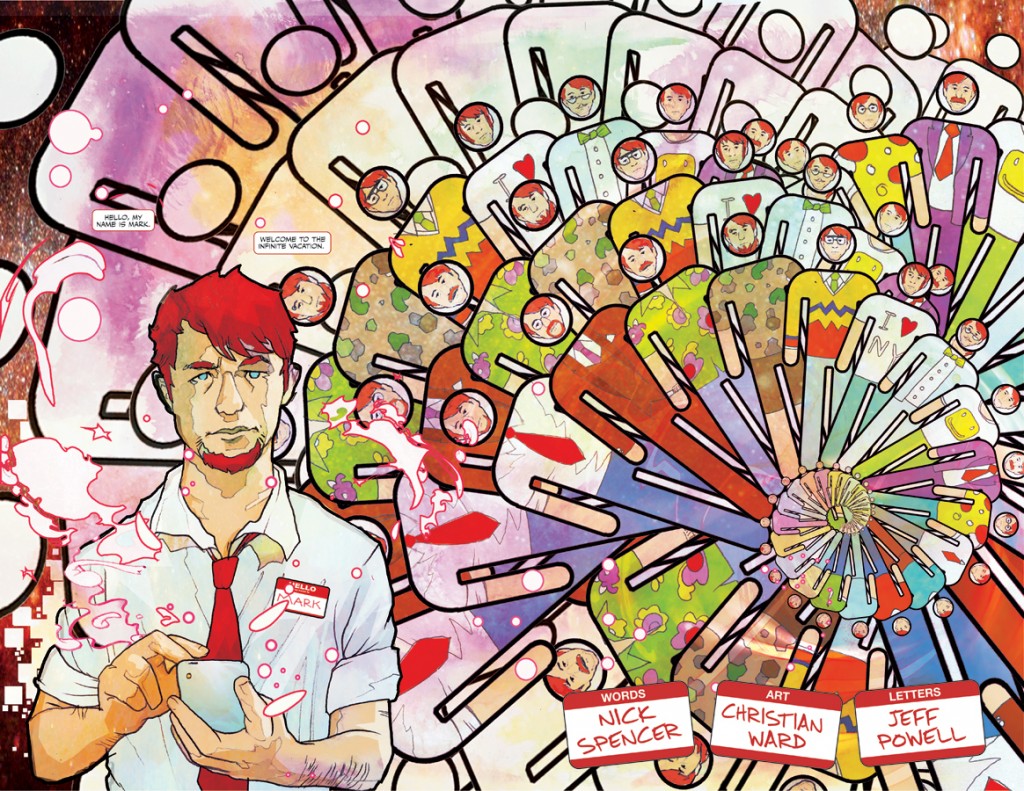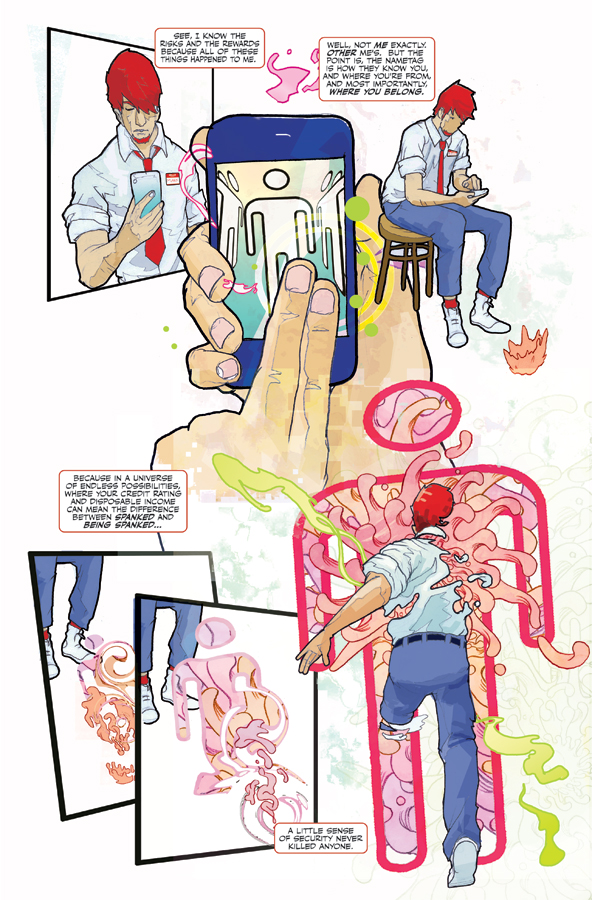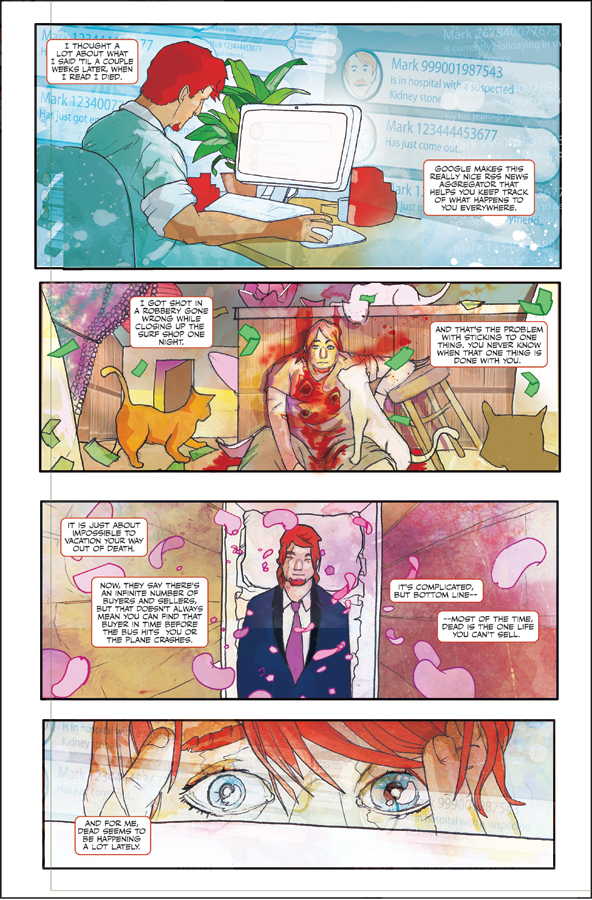 While the tide is turning, comics are still an under-appreciated medium in 2011. This despite increased interest in superheroes given the Hollywood treatment and critical attention to thoughtful indie pieces like Fun Home and Love and Rockets. It’s a shame because comics’ juxtaposed panels, their special way of framing time in terms of space, are well equipped to address those intersections of identity, technology, and visual representation that get so much play in mainstream and academic press. Image Comics’ Infinite Vacation is one new ongoing title that tackles those ideas head on.
While the tide is turning, comics are still an under-appreciated medium in 2011. This despite increased interest in superheroes given the Hollywood treatment and critical attention to thoughtful indie pieces like Fun Home and Love and Rockets. It’s a shame because comics’ juxtaposed panels, their special way of framing time in terms of space, are well equipped to address those intersections of identity, technology, and visual representation that get so much play in mainstream and academic press. Image Comics’ Infinite Vacation is one new ongoing title that tackles those ideas head on.
Writer Nick Spencer is a rising star whose big hit, Morning Glories, blends teenage drama with the surreal paranoia of 60s TV thriller The Prisoner. In Infinite Vacation, Spencer teams with artist Christian Ward to tell the story of Mark, daily user of a ubiquitous, near-future technology which allows anyone to buy or sell their existence in parallel universes through a smartphone app; for $25,000 Mark can become the hero cop version of himself, and it’ll cost at least $3000 for him to become a Mark who did not just get walked out on by that mystery girl in the coffee shop.
Mark is a cyborg less like Robocop and more like the average Facebook user who presents their preferred self to the world via an array of edited images, clicked “likes”, and comments with friends (i.e., exactly how Cyborgology editors define the cyborg in their inaugural post). Identity definition and presentation through web spaces and consumer devices is a major theme in Infinite Vacation, whether it’s the RSS feed of your alternate selves’ lives and deaths or that mystery girl saying, “That thing in your hand isn’t worth shit to me…” when Mark tries to prove his seriousness by showing how expensive his app-assisted reality purchase would have been. A gorgeous opening spread (below) has infinite Marks fitted into generic male outlines, reminiscent of your chosen profile picture replacing the pale blue Facebook default.
 It’s risky business writing on a comics’ first issue. As with TV premiers, you never know if the creators will follow through on early promise. Still, at this stage I think I can see the shape of two core critiques of digital identity presentation in Infinite Vacation. First, Spencer explores the permanence of digital identity and its relation to physical artifacts of the same. Early on, Mark stresses the importance of his name tag which distinguishes one universe’s self from another and logs one’s place in the multiverse along with one’s record of purchases. There’s also a simmering conflict with the ‘Deadenders’ who refuse to use the Infinite Vacation. Mark refers to them as “the reality Amish”. This echoes the concerns of a generation worrying whether their party pictures or search history will follow them to a job interview, as well as Internet-era debates on the tenuous divide between material reality and its representation. Deadenders like the mystery girl call Mark’s vacation experiences fake but the lives and deaths of other Marks are just as real as his. Most readers will have experienced or witnessed the drama that ensues from a relationship status change on Facebook—is that just a silly epiphenomenon of real change, or a real sign that you’re presenting a new self to the world?
It’s risky business writing on a comics’ first issue. As with TV premiers, you never know if the creators will follow through on early promise. Still, at this stage I think I can see the shape of two core critiques of digital identity presentation in Infinite Vacation. First, Spencer explores the permanence of digital identity and its relation to physical artifacts of the same. Early on, Mark stresses the importance of his name tag which distinguishes one universe’s self from another and logs one’s place in the multiverse along with one’s record of purchases. There’s also a simmering conflict with the ‘Deadenders’ who refuse to use the Infinite Vacation. Mark refers to them as “the reality Amish”. This echoes the concerns of a generation worrying whether their party pictures or search history will follow them to a job interview, as well as Internet-era debates on the tenuous divide between material reality and its representation. Deadenders like the mystery girl call Mark’s vacation experiences fake but the lives and deaths of other Marks are just as real as his. Most readers will have experienced or witnessed the drama that ensues from a relationship status change on Facebook—is that just a silly epiphenomenon of real change, or a real sign that you’re presenting a new self to the world?
Second, Infinite Vacation’s consumerism seems to indict the monetization of identity in Web 2.0 walled gardens. Mark can easily change his self-presentation, but only through serious app-spending on a phone similar to Apple’s notoriously locked-up, non-generative iPhone. This also reminds me of Facebook’s walled garden: where self-definition via text has gradually given way to more visual choices of “likes” and geographic “check-ins” at the virtual doors of major businesses. This is the dark side of Web 2.0: We are connected and social, but, especially at the technical level, locked out from any tinkering with our data and encouraged to leave our processing and presentation needs to proprietary Web services. Mark’s infinite identities, and the company that facilitates their purchase, may offer a trippy, visual alternative to book-length Internet fright-fests like The Future of the Internet and How to Stop It or The Net Delusion: The Dark Side of Internet Freedom.
Like I said, I can’t predict where this series will go; but this strong early showing offers creative critiques accessible to all comers. Personally, I’m excited to bring it to classrooms as a complement to more social scientific looks at Internet identity or as a point of entry for discussion on how digital natives present their selves to the world.


Comments 2
PJ Patella-Rey — February 1, 2011
Very interesting Daniel. The illustrations are gorgeous. I'm going to have to read this with your comments in mind.
Do you think it might be a good tool for classroom use?
Dan Greene — February 1, 2011
Thanks PJ.
I make a couple of gestures towards classroom application in the end, but, in general, comics are great for helping students think critically about media, power relations, and identity. The novelty of form spikes interest in a way novels don't, and the mixed media gives students an opportunity to frame identities or oppressions in visual forms as well as textual--so different voices, ideas, and timeframes can sensibly compete on the same page. I've had great luck with comics in a variety of classroom settings.
Right now I'm working with an old mentor on an article about using comics to teach accessible feminist criticism in historical and pop cultural texts. I'll pass that to you guys once completed.